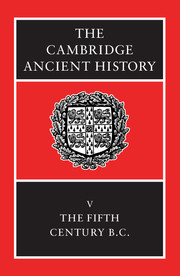Book contents
- Frontmatter
- Contents
- List of maps
- List of text-figures
- Preface
- 1 Sources, chronology, method
- 2 Greece after the Persian Wars
- 3 The Delian League to 449 b. c.
- 4 The Athenian revolution
- 5 Mainland Greece, 479–451 b. c.
- 6 The Thirty Years' Peace
- 7 Sicily, 478-431 b.c.
- 8 Greek culture, religion and society in the fifth century b.c.
- 9 The Archidamian War
- 10 The Peace of Nicias and the Sicilian Expedition
- 11 The Spartan Resurgence
- Chronological Notes
- Chronological Table
- BIBLIOGRAPHY
- Index
- 1 Greece and Western Asia Minor
- References
4 - The Athenian revolution
Published online by Cambridge University Press: 28 March 2008
- Frontmatter
- Contents
- List of maps
- List of text-figures
- Preface
- 1 Sources, chronology, method
- 2 Greece after the Persian Wars
- 3 The Delian League to 449 b. c.
- 4 The Athenian revolution
- 5 Mainland Greece, 479–451 b. c.
- 6 The Thirty Years' Peace
- 7 Sicily, 478-431 b.c.
- 8 Greek culture, religion and society in the fifth century b.c.
- 9 The Archidamian War
- 10 The Peace of Nicias and the Sicilian Expedition
- 11 The Spartan Resurgence
- Chronological Notes
- Chronological Table
- BIBLIOGRAPHY
- Index
- 1 Greece and Western Asia Minor
- References
Summary
ATHENS AFTER THE PERSIAN WARS
We have little enough evidence for the external history of the Greek cities between the Persian Wars and the Peloponnesian War; we have less for the internal history even of Athens. Thucydides provides information only on Themistocles: his clash with Sparta over the rebuilding of Athens' walls (1.90–2), and the story of his ostracism and his flight to the Persians (1.135–8). The Athenaion Politeia tells us of a period of good government in which the Areopagus was predominant (23.1–2); and of the leadership of Themistocles and Aristides, the foundation of the Delian League and the resulting provision of trophe (maintenance) for the Athenians (23.2–24); then follow Ephialtes' attack on the Areopagus and (probably an addition to the original text) an anecdote associating Themistocles with him in that attack (25). The aristocrats had no leader except Cimon, and the constitution became ‘slacker’ (26.1); in the 450s the archonship was opened to the zeugitai (the third of the four property classes), the dikastai kata demous (deme judges) were revived, and the law of Pericles was enacted, which limited citizenship to those whose parents were both Athenians (26.2-4); Pericles attacked the Areopagus and fostered Athens' naval power; to rival Cimon's generosity with his own wealth he used the state's wealth to introduce payment for jury service (27). There are short lives by Nepos of Themistocles, Aristides and Cimon, and longer lives by Plutarch of these three and of Pericles.
Keywords
- Type
- Chapter
- Information
- The Cambridge Ancient History , pp. 62 - 95Publisher: Cambridge University PressPrint publication year: 1992
References
- 8
- Cited by

